
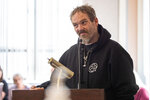




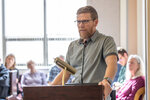
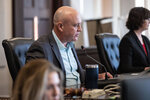


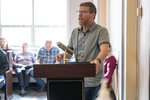
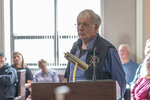

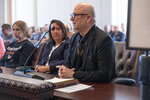
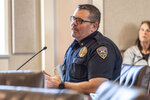
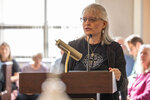

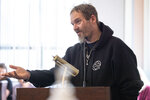

An ordinance that could shutter Lewis County’s only needle exchange program — or at least limit its operations to a brick-and-mortar location — was tabled for one week following roughly an hour of public comment Tuesday at the county courthouse.
“I think there are a couple of additional amendments I think would be prudent given the testimony we’ve heard today from throughout the community,” Lewis County Commissioner Scott Brummer said Tuesday. “I think it’s important that we get it right and weigh the testimony. That’s what the citizens’ input is for.”
According to the Board of Lewis County Commissioners, the additional week will allow for consideration of Ordinance 1354, which Gather Church Pastor Cole Meckle argues would hinder the operation of its sterile needle exchange program.
“There’s a number of amendments I would like to consider. The idea of them at least being able to utilize their facility is good,” Commissioner Lindsey Pollock said Tuesday. “However, fundamentally, prohibiting mobile access in a county this size is not productive.”
The Lewis County commissioners are set to further consider the ordinance at 10 a.m. March 26.
If passed, the ordinance as drafted would ban mobile needle exchange programs, require program operators to offer “on-site counseling or referrals for an approved substance use disorder treatment program,” ban needle exchange programs from use as a “safe or supervised injection site” and ban county money from funding such programs, among other requirements.
An amendment proposed by Commissioner Sean Swope and passed Tuesday would allow Gather, the county’s sole needle exchange operator, to operate its mobile unit exclusively at their clinic on Tower Avenue in Centralia through Dec. 31, 2025. According to Pollock, an explicit ban on mobile units could prevent Gather or other organizations from expanding the use of mobile units in the future.
The ordinance would require the needle exchange to operate as a one-for-one — meaning to get a new needle, a participant would have to turn in a used one — and would forbid “other drug paraphernalia” from being “issued or distributed in any manner.”
Swope originally brought the ordinance forward.
If it passes, Lewis County would become the first county in the state to adopt stricter restrictions on such programs.
Mindy Greenwood, substance use program administrator at Cascade Community Healthcare, and Richard Stride, Cascade’s CEO, testified in support of the ordinance and said while they don’t necessarily oppose needle exchange programs, additional regulation is needed.
“We’re not against needle exchange, but we think it needs to be done responsibly,” Stride said. “And people who are in those types of programs need to be given the opportunity to engage in services so that they can become what they want to become, rather than just live their daily life.”
While there was universal agreement among those in the Lewis County Courthouse that the record-breaking death total from drug overdoses is a scourge that must be addressed, the debate centered around whether providing clean needles to those in addiction enables continued substance abuse or provides an outlet to encourage and promote treatment services.
“I’m saddened that people don’t learn more about how we operate, and it’s clear there's a lot of misinformation right now in this room,” Meckle said. “We work very hard to connect people with resources.”
Perhaps no moment better encapsulated the debate than the public comment of Chad Nickols, who said he’s struggled with addiction since the age of 12 and became homeless nearly 20 years ago. While accessing Gather’s Syringe Services Program (SSP), he slowly bonded with a staff member.
“I started asking questions about other services Gather has to offer. They signed me up for coordinated entry at Blakeslee Camp during SSP. We started having conversations about new ways to live. I wasn’t ready yet, but never felt judged for it,” Nickols said. “If it wasn’t for the Narcan I got from the Gather SSP, I wouldn’t be here today.”
During a stint in jail in November, Nickols told representatives from Gather that he was ready for a change. After being released, Nickols entered a clean and sober house and began to volunteer at Gather, before finding a job.
As of Tuesday, Nickols is 113 days clean, has reconnected with his children and has met his grandson for the first time.
“I love my life today, and that is something I never thought I’d be able to say,” Nickols said. “Without Gather’s mobile needle exchange, I would still be on the same self-destructive path that I’ve been on for the past 33 years.”
Research funded by the National Institute on Drug Abuse (NIDA) found that “syringe services programs do not increase drug use.” According to the NIDA, “researchers found 86% fewer used syringes in parks and sidewalks in a community that had a syringe services program than in a similar community without an equivalent program.”
While the program has earned praise from the Washington State Department of Health and was featured in The Seattle Times as a potential “secret sauce” against the drug epidemic, not everyone is convinced, arguing the distribution of clean needles is enablement and hinders recovery.
Representing the Morton Rifle and Pistol Club, Fred Ahrens said Tuesday his organization opposes any program that “encourages drug use in Lewis County.”
“The question that’s been asked here is who's going to pay for this,” Ahrens said. “Everybody in here knew the answer before the question was asked. It’s the taxpayers of our great constitutional republic who are ultimately paying for all of this.”
While the ordinance expressly bans Lewis County taxpayer dollars from funding such programs, Gather Church does not receive county funding for the current needle exchange operation.
According to Patty Howard, associate pastor of Gather Church, Gather receives funding from the program through the Washington state Department of Health (DOH) for supplies, while Gather covers the cost of staff time, disposal, fuel and other associated costs.
“As I’ve sat in meetings, heard conversations and read on social media, I’ve heard and seen an abundance of misinformation regarding needle exchanges in general, and our program in particular,” Howard said. “And I believe that misinformation has been used to write this ordinance.”
According to the Centers for Disease Control and Prevention, the programs are “community-based programs that provide access to sterile needles and syringes, facilitate safe disposal of used syringes, and provide and link to other important services and programs.”
A database compiled by the DOH, which regulates such programs, shows 34 programs in 27 counties. Like many others, Gather distributes materials such as alcohol wipes, cotton balls, clean water and containers.
In a March 15 column in The Chronicle, Swope argued the county needs “meaningful intervention, not just more camps, injection sites, exchanges, safer supply or free stuff.”
While the ordinance prohibits the establishment of a safe injection site, Gather Church does not operate one, and the establishment of one has not been seriously considered in Lewis County.
Repeated attempts to create a safe injection site in Seattle have fizzled, though two have opened in New York City.
A report to the Washington Legislature studying the potential impact of a safe supply, which is defined as “a legal and regulated supply of mind or body altering substances that traditionally have only been accessible through illicit markets,” is due in December.
According to a preliminary report written by the Washington state Health Care Authority, the study will examine “whether there is evidence that a proposed ‘safe supply’ would have an impact on fatal or nonfatal overdose, drug diversion, or associated health and community impacts.”
“The truth is no one starts using drugs because someone gives them a free syringe, and no one stops using drugs because they don’t,” Howard said. “We’re enabling people to live healthier lives until they’re ready to make a new choice. The drug use would happen with or without us, but the relationships we form with people who use drugs would not.”
Speaking in place of Police Chief Stacy Denham, Centralia Police Commander Andy Caldwell said action must be taken to address the rise of overdoses and drug use in the community.
“Any change towards accountability in programs related to illegal possession, sales, consumption and ingesting controlled substances, I think, is a step in the right direction,” Caldwell said.
According to Caldwell, the number of overdoses in Centralia nearly doubled from 2021 to 2023, increasing from 34 to 65. In the first two-and-a-half months of 2024, Centralia sits at 19 overdoses.
“When we talk about peer-reviewed studies, it’s one thing to hear a study about a scholar writing something out or looking at something,” Swope said. “But when you go to the front lines, and you go look at places like San Francisco, Seattle, Blakeslee Junction, and to see what the actual results are, you begin to talk to the different people there. To me, that’s the research I’ve done.”
Research from the Centers for Disease Control and Prevention found nearly 70% of the overdose deaths in 2022 involved illegally manufactured fentanyl, a powder commonly smoked or ingested rather than injected through a syringe. Data shows the uptick in overdose deaths in both San Francisco and Seattle were tied to the rise in fentanyl use.
“I want to make this abundantly clear: People are smoking fentanyl. There’s not a reason, unfortunately, for them to come and meet us. And yes, we go out and seek people and try to find people, but people aren’t coming to us. So there’s a lack of engagement,” Meckle said.